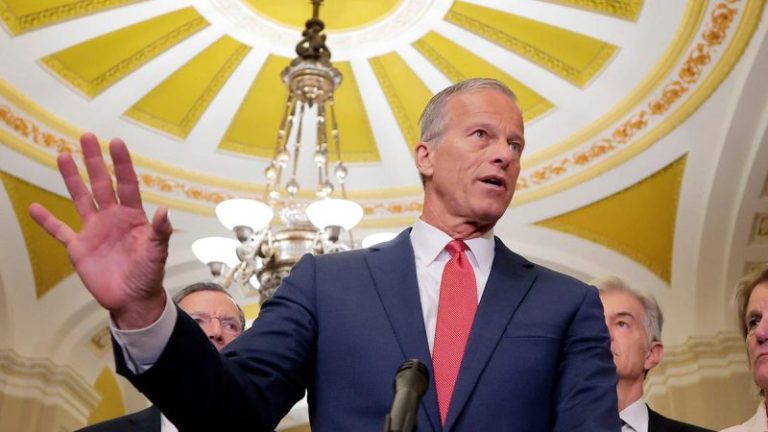Large crowds gathered at the Enqelab Square in central Tehran on Sunday evening, protesting the strikes. Footage published by the state-affiliated Fars News Agency showed people waving Iranian flags and punching the air, carrying signs that read: “Down with the USA, down with Israel.”
Hamid Rasaee, a politician, said even people critical of the regime were protesting.
Trump ordered attacks on three of Iran’s most important nuclear facilities early Sunday morning – a move that has placed the US in the center of the conflict between Israel and Iran.
Iranians had faced the possibility of US intervention ever since Israel launched its strikes on nuclear and military targets last week – but many believed any action was days away.
That’s in part because Trump said Thursday he would decide whether to strike Iran within two weeks, seemingly opening a window for negotiations. That all changed early Sunday, when American bombers dropped more than a dozen massive “bunker buster” bombs on Iran’s Fordow and Natanz nuclear facilities, and Tomahawk missiles launched from the sea struck Isfahan.
“We do not have nuclear weapons, so why does he strike us?” he added, alluding to the Iranian regime’s insistence the country’s nuclear program is peaceful. Trump has claimed Iran was weeks away from acquiring a nuclear weapon, dismissing assessments from his own intelligence community that Iran was still years away from a weapon.
Qom residents slept through the attacks
While Trump has claimed the three sites struck by the US were “totally obliterated,” his defense secretary has said the full impact is still being assessed. And unlike the strikes by Israel in recent days, some of which targeted densely populated areas, the US attacks were concentrated in locations off-limits to most civilians.
Residents of Qom, a city some 30 kilometers (18 miles) from the Fordow nuclear site, woke to the sound of emergency vehicles’ sirens and the news that the secretive complex had been bombed a few hours earlier.
Five people living in Qom said they were surprised to learn what had happened when they got up, having heard nothing overnight.
Qom does not have an aerial attack warning system, so residents would have had no warning before the strikes.
Qom is considered a holy city, home to Iran’s largest and most famous Shia seminary. Iran’s Supreme Leader Ayatollah Ali Khamenei studied at the Qom Seminary, as did several of Iran’s former presidents.
Similarly, people living in a village some 35 kilometers (22 miles) from the Natanz facility said they heard nothing overnight.
In Tehran, far from the targeted nuclear sites, many were calling for Iran to respond with force. Fars released a compilation of short interviews with people on the streets of the capital Sunday.
Each of the eight people featured urged a retaliation – with most saying Iran should strike US bases in the region and close down the Strait of Hormuz on Iran’s southern shore, through which a third of global seaborne oil trade passes.
In Iran, signs of dissent tend to be quickly quashed, making it dangerous for people to express disagreement with the regime.
But Mohsen Milani, an Iranian scholar who has lived in the US for decades, said the US attack on Iran could spark more genuine support for the regime.
“It could ignite a new wave of nationalism, damage the future of U.S.-Iran relations more than the 1953 coup, accelerate Tehran’s pivot to Russia and China, and fundamentally reshape Iran’s defense, deterrence, and nuclear posture,” he said in a post on X.
Some of this sentiment was already on show in Tehran on Sunday.
“I will stay here and I will sacrifice my life and my blood for my country,” she said.
Everywhere around her, people were protesting the US, many holding anti-Trump signs and posters. Some of the posters ended up on the ground, where people stamped on them.
“We were living our normal lives and they attacked us. If someone strikes the United States, would they not answer? Of course they would,” she said.
Another person living in Tehran said they believed the regime was greatly weakened by the US strikes – because its opponents would now be able to call its bluff.
“The claims that the Iranian regime has always made – that it will attack all American bases and close the Strait of Hormuz – they made all these claims and the whole world saw that (the US) came and easily hit the Fordow and Natanz sites … but Iran was completely silent and no fighter planes took off and (it) used no defenses or missiles,” the person said, adding that if there is no response in the coming days, the regime’s supporters could abandon it.
“No sane person will stand by someone who is in a weak position, not even their own supporters,” they said.










